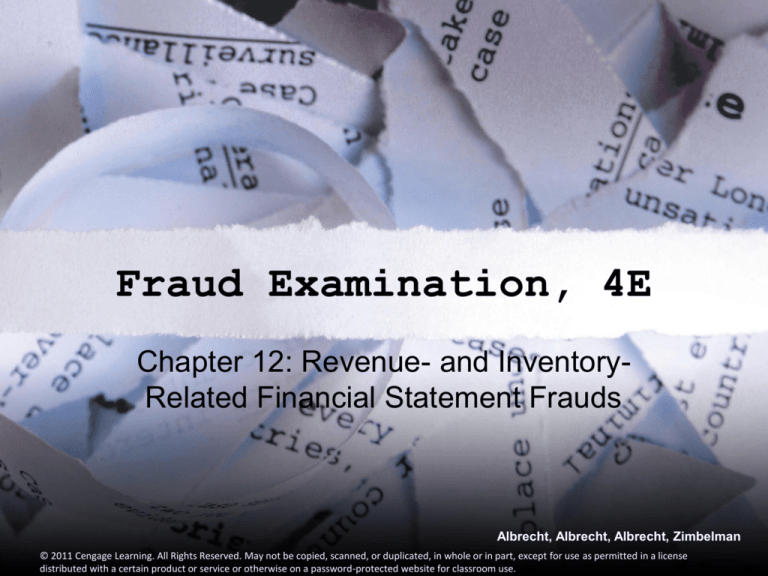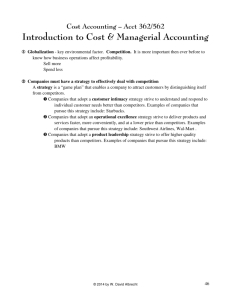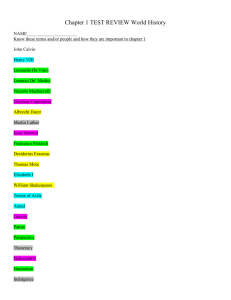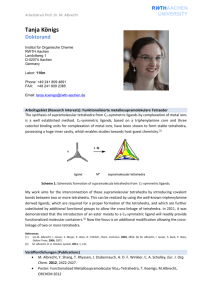
Fraud Examination, 4E
Chapter 12: Revenue- and InventoryRelated Financial Statement Frauds
Albrecht, Albrecht, Albrecht, Zimbelman
© 2011 Cengage Learning. All Rights Reserved. May not be copied, scanned, or duplicated, in whole or in part, except for use as permitted in a license
distributed with a certain product or service or otherwise on a password-protected website for classroom use.
Learning Objectives
Identify revenue-related financial statement fraud
schemes.
List ways to search for symptoms of revenuerelated financial statement fraud.
Understand the importance of, and ways to follow
up on, revenue-related fraud symptoms.
Discuss inventory-related financial statement
fraud schemes.
Albrecht, Albrecht, Albrecht, Zimbelman
© 2011 Cengage Learning. All Rights Reserved. May not be copied, scanned, or duplicated, in whole or in part, except for use as permitted in a license
Learning Objectives
Identify ways to search for inventory-related
financial statement fraud symptoms.
Explain the importance of, and ways to follow up
on, inventory-related fraud symptoms.
Albrecht, Albrecht, Albrecht, Zimbelman
© 2011 Cengage Learning. All Rights Reserved. May not be copied, scanned, or duplicated, in whole or in part, except for use as permitted in a license
Revenue-Related Fraud
The most common
accounts manipulated
when perpetrating
financial statement fraud
are revenues and/or
receivables
Over half of all financial
statement frauds involved
revenues and/or accounts
receivable accounts
(COSO-sponsored
research)
Albrecht, Albrecht, Albrecht, Zimbelman
© 2011 Cengage Learning. All Rights Reserved. May not be copied, scanned, or duplicated, in whole or in part, except for use as permitted in a license
Revenue-Related Fraud
Two reasons for the prevalence of revenuerelated financial statement fraud:
The availability of acceptable alternatives for
recognizing revenue
The ease of manipulating net income using revenue
and receivable accounts
Albrecht, Albrecht, Albrecht, Zimbelman
© 2011 Cengage Learning. All Rights Reserved. May not be copied, scanned, or duplicated, in whole or in part, except for use as permitted in a license
Revenue-Related Fraud
Revenue-Related fraud exposures should be
considered in every business.
Common Revenue-related Fraud Schemes:
Related-party transactions
Sham sales
Bill-and-hold sales
Side agreements
Consignment sales
Channel stuffing
Lapping or kiting
Albrecht, Albrecht, Albrecht, Zimbelman
© 2011 Cengage Learning. All Rights Reserved. May not be copied, scanned, or duplicated, in whole or in part, except for use as permitted in a license
Revenue-Related Fraud
Common Revenue-related Fraud Schemes:
Redating or refreshing transactions
Liberal return policies
Partial shipment schemes
Improper cutoff
Round-tripping
Albrecht, Albrecht, Albrecht, Zimbelman
© 2011 Cengage Learning. All Rights Reserved. May not be copied, scanned, or duplicated, in whole or in part, except for use as permitted in a license
Revenue-Related Fraud
Albrecht, Albrecht, Albrecht, Zimbelman
© 2011 Cengage Learning. All Rights Reserved. May not be copied, scanned, or duplicated, in whole or in part, except for use as permitted in a license
Identifying Revenue-Related
Fraud Symptoms
Fraud is rarely observed
Fraud symptoms can be divided into six
categories:
Analytical symptoms
Accounting or documentary symptoms
Lifestyle symptoms
Control symptoms
Behavioral and verbal symptoms
Tips and complaints
Albrecht, Albrecht, Albrecht, Zimbelman
© 2011 Cengage Learning. All Rights Reserved. May not be copied, scanned, or duplicated, in whole or in part, except for use as permitted in a license
Identifying Revenue-Related
Fraud
Analytical Symptoms
Revenue or sales that appear too high.
Sales discounts that appear too low.
Sales returns that appear too low.
Bad debt expense that appears too low.
Accounts receivable that appear too high or are
increasing too fast.
The allowance for doubtful accounts appears too low.
Too little cash is collected relative to reported revenues
Albrecht, Albrecht, Albrecht, Zimbelman
© 2011 Cengage Learning. All Rights Reserved. May not be copied, scanned, or duplicated, in whole or in part, except for use as permitted in a license
Identifying Revenue-Related
Fraud
Accounting or Documentary Symptoms
Unsupported or unauthorized revenue-related balances
or transactions.
Missing documents in the revenue cycle.
Photocopies where original should exist.
Unusual journal entries.
Revenue-related ledgers (sales, cash receipts, etc.)
that do not balance.
Albrecht, Albrecht, Albrecht, Zimbelman
© 2011 Cengage Learning. All Rights Reserved. May not be copied, scanned, or duplicated, in whole or in part, except for use as permitted in a license
Identifying Revenue-Related
Fraud
Control Symptoms
Management override of significant internal control
activities related to the revenue cycle.
New, unusual, or large customers that appear not to
have gone through the customer approval process.
Weaknesses in the cutoff processes or other key
accounting processes.
Albrecht, Albrecht, Albrecht, Zimbelman
© 2011 Cengage Learning. All Rights Reserved. May not be copied, scanned, or duplicated, in whole or in part, except for use as permitted in a license
Identifying Revenue-Related
Fraud
Behavioral and Verbal Symptoms
Inconsistant, vague, or implausible responses from
management or employees arising from revenue
inquiries or analytical procedures.
Denied access to facilities, employees, records,
customers, vendors, or others from whom revenuerelated audit evidence might be sought.
Undue time pressures imposed by management to
resolve contentious or complex revenue related issues.
Albrecht, Albrecht, Albrecht, Zimbelman
© 2011 Cengage Learning. All Rights Reserved. May not be copied, scanned, or duplicated, in whole or in part, except for use as permitted in a license
Identifying Revenue-Related
Fraud
Lifestyle Symptoms
Major sales of company
stock around earnings
releases or other unusual
dates.
Significant bonuses tied to
meeting earnings forecasts.
Executives’ personal net
worth tied up in company
stock.
Albrecht, Albrecht, Albrecht, Zimbelman
© 2011 Cengage Learning. All Rights Reserved. May not be copied, scanned, or duplicated, in whole or in part, except for use as permitted in a license
Identifying Revenue-Related
Fraud
Tips and Complaints
Tips or complaints that revenue-related fraud (any of
the schemes discussed) might be occurring, either from
the company whistleblower system or in other ways.
Revenue frauds disclosed at companies with which this
company does significant amounts of business.
Albrecht, Albrecht, Albrecht, Zimbelman
© 2011 Cengage Learning. All Rights Reserved. May not be copied, scanned, or duplicated, in whole or in part, except for use as permitted in a license
Inventory & Cost of Goods
Sold Frauds
Albrecht, Albrecht, Albrecht, Zimbelman
© 2011 Cengage Learning. All Rights Reserved. May not be copied, scanned, or duplicated, in whole or in part, except for use as permitted in a license
Inventory & Cost of Goods
Sold Frauds
Most common inventory-related fraud
schemes:
Double counting
Capitalizing
Cutoff problems
Overestimating inventory
Bill-and-hold sales
Consigned inventory
Albrecht, Albrecht, Albrecht, Zimbelman
© 2011 Cengage Learning. All Rights Reserved. May not be copied, scanned, or duplicated, in whole or in part, except for use as permitted in a license
Inventory & Cost of Goods
Sold Frauds
Albrecht, Albrecht, Albrecht, Zimbelman
© 2011 Cengage Learning. All Rights Reserved. May not be copied, scanned, or duplicated, in whole or in part, except for use as permitted in a license
Inventory & Cost of Goods
Sold Frauds
Analytical Symptoms
Reported inventory balances that appear too high or are increasing
too fast.
Reported cost of goods sold balances that appear too low or are
decreasing too fast.
Reported purchase returns that appear too high or are increasing
too rapidly.
Reported purchase discounts that appear too high or are
increasing too rapidly.
Reported purchases that appear too low for sales or inventory
levels.
Capitalized inventory that looks as if it should be expensed.
Albrecht, Albrecht, Albrecht, Zimbelman
© 2011 Cengage Learning. All Rights Reserved. May not be copied, scanned, or duplicated, in whole or in part, except for use as permitted in a license
Inventory & Cost of Goods
Sold Frauds
Accounting or Documentary Symptoms
Inventory or cost of goods sold transactions that are not
recorded in a complete or timely manner or improperly
recorded as to amount, accounting period,
classification, or entity.
Unsupported or unauthorized inventory or cost of goods
sold-related transactions.
End-of-period inventory or cost of goods sold
adjustments that significantly change the entity’s
financial results.
Missing documents related to inventory and/or cost of
Albrecht, Albrecht, Albrecht, Zimbelman
goods sold.
© 2011 Cengage Learning. All Rights Reserved. May not be copied, scanned, or duplicated, in whole or in part, except for use as permitted in a license
Inventory & Cost of Goods
Sold Frauds
Control Symptoms
Management override of significant internal control
activities related to purchases, inventory, or cost of
goods sold.
New or unusual vendors that appear not to have gone
through the regular vendor-approval process.
Weaknesses in the inventory counting process.
Albrecht, Albrecht, Albrecht, Zimbelman
© 2011 Cengage Learning. All Rights Reserved. May not be copied, scanned, or duplicated, in whole or in part, except for use as permitted in a license
Inventory & Cost of Goods
Sold Frauds
Behavioral and Verbal Symptoms
Inconsistant, vague, or implausible responses from
management or employees arising from inventory,
purchase, or cost of goods sold-related inquiries or
analytical procedures.
Undue time pressures imposed by management to
resolve contentious or complex inventory or cost of
goods sold-related issues.
Unusual delays by the entity in providing requested
inventory or cost of goods sold-related information.
Albrecht, Albrecht, Albrecht, Zimbelman
© 2011 Cengage Learning. All Rights Reserved. May not be copied, scanned, or duplicated, in whole or in part, except for use as permitted in a license
Inventory & Cost of Goods
Sold Frauds
Lifestyle Symptoms
Similar symptoms to the revenue-related frauds (e.g.,
stock sales, bonuses, and stock ownership). However,
lifestyle symptoms are often not very effective for
detecting financial statement frauds
Tips and Complaints
Tips or complaints that come in through the whistleblowing system or through other means may suggest
that inventory-related fraud schemes might be
occurring.
Albrecht, Albrecht, Albrecht, Zimbelman
© 2011 Cengage Learning. All Rights Reserved. May not be copied, scanned, or duplicated, in whole or in part, except for use as permitted in a license
Inventory & Cost of Goods
Sold Frauds
Analyzing financial statements for inventory fraud
Albrecht, Albrecht, Albrecht, Zimbelman
© 2011 Cengage Learning. All Rights Reserved. May not be copied, scanned, or duplicated, in whole or in part, except for use as permitted in a license
Analyzing Financial
Statements
Albrecht, Albrecht, Albrecht, Zimbelman
© 2011 Cengage Learning. All Rights Reserved. May not be copied, scanned, or duplicated, in whole or in part, except for use as permitted in a license






